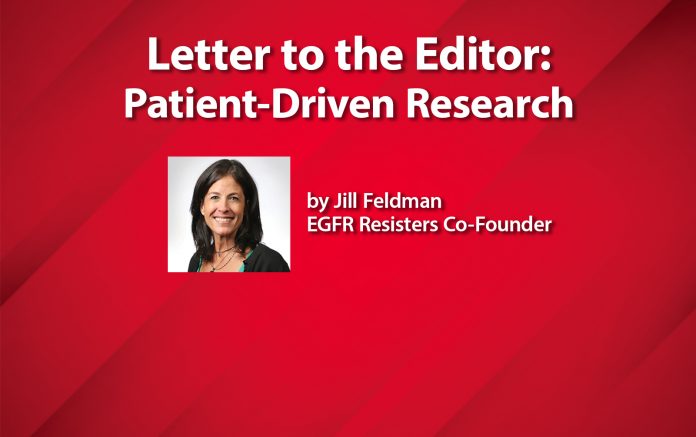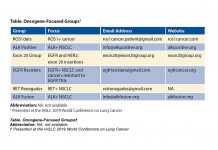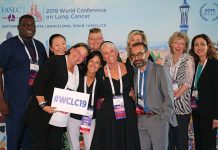By Jill Feldman, EGFR Resisters Co-Founder
Posted: December 11, 2019

I was so glad to see the article by Dr. Amy Moore on PDX models in the October issue. As a Co-Founder of the EGFR Resisters, our collaboration with the GO2 Foundation for Lung Cancer is empowering patients to participate in studies that will directly accelerate research in EGFR-positive lung cancer. We are thrilled to be a part of supporting this cutting-edge research that will help researchers understand what is causing the cancer to become treatment resistant. (Note: This trial is currently enrolling, so please refer all eligible patients. Clinical Trial ID: NCT03872440)
After a dramatic response to initial therapy, it is devastating to develop resistance to treatment. There is a sense of urgency to understand the underlying mechanisms of drug resistance in EGFR-positive lung cancer and to identify new therapeutic options. We must convert that devastation to hope.
I can tell you firsthand that research matters. It means more and better treatment options for those in our community. It is our lifeline, our future, and it is hope. Many of us are depending on the next promising research advance so that we can continue to see and reach meaningful milestones with our families and friends.
Our goal is to change EGFR-positive lung cancer into a manageable chronic disease.
Our hope is that combining the collective patient voice with quality research will lead to longer and better lives for people with EGFR-positive lung cancer. ✦

Building PDX Models for EGFR-Mutant Lung Cancer: The Power of Partnerships
By Amy C. Moore, PhD
Posted: November 12, 2019
Globally, approximately 140,000 patients per year diagnosed with NSCLC harbor a mutation in the epidermal growth factor receptor (EGFR) gene.1 In the United States, approximately 15% of patients with NSCLC have EGFR mutations, whereas the likelihood is even higher in patients residing in Asia.
The challenge in treating patients with EGFR-mutant lung cancer is that most individuals ultimately develop resistance to tyrosine kinase inhibitors (TKIs), which remain the standard of care. Further, for patients with EGFR or HER2 exon 20 insertions, commercially available TKIs simply fail to work at all. Thus, understanding mechanisms of resistance and developing better therapies is key to improving outcomes for these patients.
Creating a Model
Based on the success of the ROS1ders lung cancer patient group in launching a project to create cancer models, in early 2018, the EGFR Resisters (a patient advocacy group consisting of more than 1,000 patients in 29 countries) approached the Bonnie J. Addario Lung Cancer Foundation—which has since partnered with the Lung Cancer Alliance to become the GO2 Foundation for Lung Cancer—to explore ways in which the two organizations could accelerate research and improve outcomes for patients with EGFR-mutant lung cancer. Based on these discussions, the two organizations partnered with internationally renowned lung cancer expert Pasi Jänne, MD, PhD, from Dana-Farber Cancer Institute; Champions Oncology; and the Addario Lung Cancer Medical Institute (ALCMI, an international research consortium dedicated to catalyzing and accelerating the discovery, development, and delivery of new and more effective treatment options for patients with lung cancer) to create a panel of mouse models to propel research. The resulting collaboration, “A Prospective Biospecimen Collection Study from Patients with EGFR Mutant Tumors,” will establish PDX models for patients with EGFR mutations who have acquired resistance to osimertinib or other third-generation TKIs or who harbor EGFR or HER2 exon 20 insertion mutations (NCT03872440).
The study is open in the United States and Canada and uses ALCMI’s remote study capabilities, meaning patients do not have to travel to another institution to participate. Patients with EGFR-positive disease who require a biopsy or surgery for medical reasons can donate a small portion of their tumor or pleural effusion fluid for the study. Champions Oncology will then establish PDX models using the donated specimens.
“We know that we need more and better models if we are to fully understand what causes resistance in patients with EGFR-mutant lung cancer,” said Dr. Jänne, the lead investigator. “This study will help us determine how resistance occurs and will also enable us to design more effective treatments going forward.”
This study provides physicians and patients in the lung cancer community with an opportunity to actively participate in research that will accelerate understanding of resistance mechanisms and help drive the development of new therapies for EGFR-mutant lung cancer. These models will be shared openly with research partners in academia so that patient care can be improved more quickly and successfully. ✦
For more information on the study and to determine eligibility, please call 1-888-403-EGFR or visit the study’s website.
About the Author: Dr. Moore is the director of Science and Research, GO2 Foundation for Lung Cancer.
Reference:
1. Research suggests possible new treatment for EGFR-positive lung cancer. American Society of Clinical Oncology. sciencedaily.com/releases/2017/06/170605110051.htm. Published June 5, 2017. Accessed October 1, 2019.











